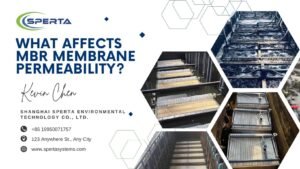In the world of wastewater treatment, technology keeps evolving. One such advancement that’s been making waves is the MBR or Membrane Bioreactor. But like all technologies, it’s essential to weigh its benefits against its drawbacks before making a decision.
MBR offers a modern approach to wastewater treatment, boasting several advantages over traditional systems. However, it has its challenges.
Curious about what MBR brings to the table? Let’s dive in and explore both its shining moments and its potential pitfalls.
What Makes MBR Stand Out?
MBR systems have become a favorite for many, and it’s easy to see why:
- High-Quality Effluent: One of MBR’s top selling points is its ability to produce clear, top-notch water. This water is often so clean that it can be reused, which is a big plus in areas where water is scarce.
- Space-Saver: Got limited space? No problem. MBR systems are compact, making them a great fit for places where space is premium.
- It’s Flexible: Whether you’re dealing with a lot of wastewater or just a little, MBR can handle it. It’s also good at treating water with different levels of pollutants.
- Less Waste: Nobody likes waste, and there’s less of it with MBR. This system produces less sludge than older systems.
- No Need for Extra Tanks: Thanks to its membrane filtration, there’s no need for additional settling tanks.
Are There Any Downsides to MBR?
While MBR has a lot going for it, it’s not perfect:
- It Can Be Pricey: Setting up an MBR system can cost more than traditional systems. And it’s not just the setup; running it can also be more expensive.
- Membranes Can Get Clogged: Over time, the membranes in an MBR system can get clogged. When this happens, they need to be cleaned or replaced, which can be a hassle.
- It Can Use a Lot of Energy: MBR systems can be energy hogs, especially if they use air to keep the membranes from clogging.
- It Needs Some TLC: To keep an MBR system running smoothly, you need to keep an eye on it and give it some regular care.
Conclusion
MBR systems offer a fresh take on wastewater treatment, with many benefits that make them a top choice for many. But they’re not a one-size-fits-all solution. Before jumping on the MBR bandwagon, it’s essential to consider its pros and cons to see if it fits your needs.
The above is the information about the advantages and disadvantages of MBR. If you still have questions about the membrane bioreactor or need to purchase MBR membranes, don’t hesitate to contact SPERTA.
Shanghai SPERTA Environmental Technology Co., Ltd. has specialized in producing water treatment products for many years. The company has the core technology of producing MBR membrane components. It has a high production capacity, aiming to build a high-quality brand of MBR production and sales all over the world. If you have any needs, please feel free to contact us.









